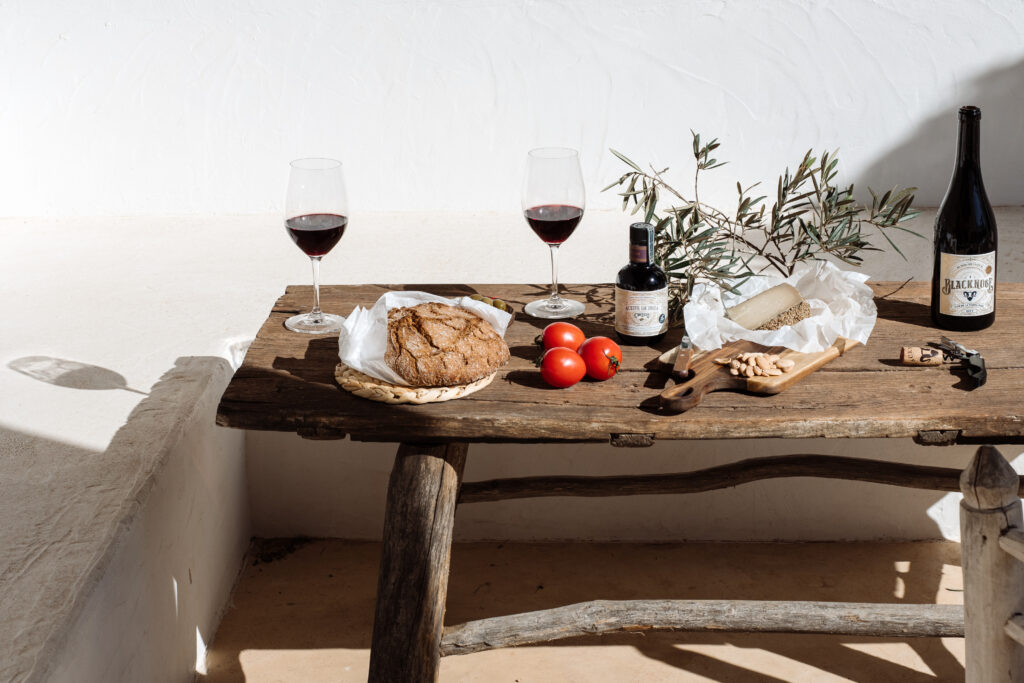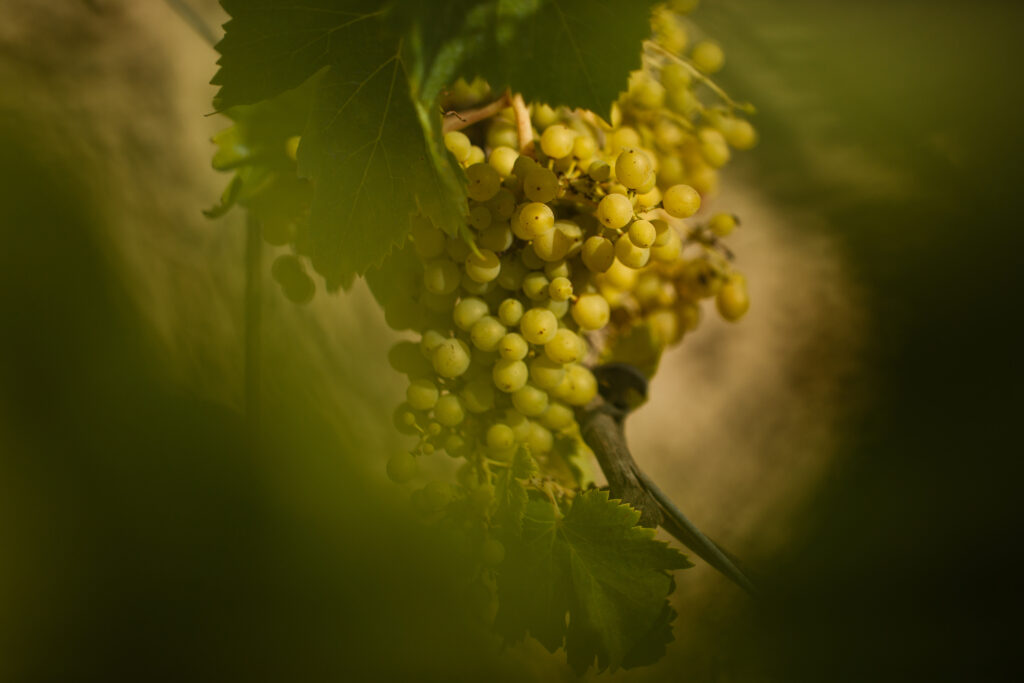Our Story

Tucked away in the rolling Saint Joan de Labritja mountains in the rugged north of Ibiza are the vineyard, the highest in Ibiza, and olive terraces of Blacknose.
I spoke to Peter Lehner of Blacknose who, together with brother Tino, is a co-creator of Blacknose. The brothers combine respect for traditional methods, Swiss wine growing knowhow and a philosophical approach to making organic wine and extra virgin olive oil in Ibiza.
Rising from the ashes of the 2011 Morna Valley fire
The devastating 2011 Morna Valley fire raged through about a third of the pine forest of northern Ibiza. But it was truly a new beginning for Swiss brothers Peter and Tino. Their house was saved but most of the pine trees on their land were burnt.
In the aftermath of the fire, the brothers went for a walk on their once pine forest covered land. They discovered that they had many more manmade terraces on their land than they’d thought.
‘We decided we weren’t going to let the pines reinvade our land,’ Peter said, ‘and quickly set about rebuilding the terrace walls and making them strong again.’
Seeing the land cleared of pine trees also sparked what Peter calls the ‘crazy idea of planting a vineyard’ on their finca, including on the newly discovered terraces.
Neither Peter nor Tino had a background in wine making. Peter has a company that imports organic food and cosmetics into Switzerland and distributes them to food stores, pharmacists, and department stores. Tino is a gastronomical entrepreneur
Olives: from decoration to commerce
Before the fire, the Lehner brothers decided to plant roughly 100 olive trees purely for decoration. Two or three harvests later, after attending olive oil sommelier courses in Italy, the brothers committed to producing olive oil. But they realised that ‘we didn’t choose the right varieties and the trees were planted much too close together’.
They made the decision to change the trees for varieties better suited to Ibiza that needed less maintenance, choosing Spanish Arbequina and Greek Koroneiki trees
Arbequina and Koroneiki trees are extremely productive. Their fruit is small and tasty and they make a delicious oil. They’re also more resilient to the menace from fruit flies. These lay their eggs in olives and eat them from the inside. Fruit flies prefer larger olives.
Peter and his team protect the trees from fruit flies by spraying white kaolin clay powder on the olives. This forms a protective barrier that prevents the fly from penetrating the surface of the olives and laying their eggs.

Blacknose now has a total of about 180 olive trees, planted far enough on the terraces that their root systems have more space to grow.
Right now, the trees are very young and Blacknose produced only around 50 litres of oil in 2023. But Peter has ambitions to produce much more. ‘I think, in the medium term, we should reach around 3-400 litres,’ he says. ‘I’m really committed to cultivating olive trees and have had lots of training. Every year I learn something new.’
Growing with biochar and biodynamic methods
The farm has been certified organic from the very beginning. In 2021 the Blacknose team began to work along biodynamic guidelines. Along with biodynamic preparations, they use biochar, for example when they last planted olive trees.
Biochar expert Crister Söderberg explains that ‘Biochar is made by burning organic waste such as wood chips and dead leaves and plants in a container with very little oxygen. Provided the biomass is untreated, no contaminating fumes and less than half the CO2 gases are released.’
Apart from helping capture and store carbon, reducing CO2 emissions, and increasing food security, applying biochar to soil also helps grow delicious fruit and vegetables.
Biodynamics is a fascinating agricultural method initiated by the philosopher and scientist Rudolf Steiner and shared in a series of lectures to farmers in 1924. It’s an ethical, ecological, and holistic approach to agriculture that recognises the spirit in nature.
Today, biodynamics is more popular than ever and is practiced in thousands of farms, vineyards and gardens across the world.
For Blacknose, the combination of biochar and biodynamics has brought remarkable results when applied to young olive trees:. ‘This year is amazing,’ he says, ‘and I’m sure we’ll double the harvest next year.’
After following the work of various biodynamic farmers over the years, Peter attended various courses in Spain and Switzerland. The Blacknose farm has been Demeter certified since 2022.
Now Peter has one step more to take. ‘Biodynamics is all about completing a circle in agriculture so your farm becomes a completely self-sustained organism,’ he tells me. ‘You need land, plants, people and biodiversity but you also need animals. That’s the next step for us.’
Given where the name Blacknose comes from, that animal may well be sheep.
A Swiss sheep inspires a brand
‘Blacknose is a race of half wild Swiss sheep from the valleys in the mountains around Valais,’ Peter explains. ‘Our family originates from there, the source of the Rhône River .In May, after the snow has melted, we bring the Blacknose sheep – Schwarznasenschafe in German – up into the mountains and leave them. When it snows for the first time in the autumn, we bring them down. They’re a really fantastic, rustic breed.’
This the reason why the Blacknose brand features a highly stylised ram’s head as its logo.
Harvesting olives early
Blacknose is always among the first to harvest its olives early, when they have the most polyphenol and are packed with antioxidants.
‘Our olive oil isn’t sweet. It’s greenish and a bit spicy. That’s what differentiates us,’ Peter says. ‘To make the oil this way, we need 90% of the olives to be green. We don’t wait until the olives are black like some growers do.’
Picking the olives isn’t especially labour-intensive. ‘We have a team of between six to eight people – family and a few locals. We pick by hand or use an electric machine. As the last harvest was rather modest, because of the youth of our trees. We finished in around five hours this year.’
Blacknose olive oil, Aciete de Ibiza – Cas Coix, is made at Oli Eivissenc des Trull de Sant Joan SL in nearby Sant Joan de Labritja, the newest mill on the island. The mill uses sophisticated Italian machinery to make high quality oil. Blacknose has a tank at the mill. The oil is bottled and labelled there after it’s decanted.
Blacknose wine: growing a vintage
After they’d made the decision to go ahead with the plantation of the vineyard, the brothers brought in a firm of Swiss wine consultants. It turned out that the Lehner brothers’ idea to start a vineyard wasn’t so crazy after all.
‘The consultants analysed the soil and the water in our well,’ Peter says. ‘Because the land is high up and there’s usually a breeze, they thought it suitable. The soil is poor but grapes like poor soil. It makes them more aromatic.’
Peter and Tino decided to plant Monastrell and Syrah, the latter not unlike the wines along the Rhône valley. In 2014, the brothers planted these first varieties. In 2016, they planted Cabernet Sauvignon. They added the Giro Ros white wine variety in 2020. This year Blacknose will sell red, white and rosé.
Blacknose wines have found fans from the very beginning. ‘We were amazed when our first vintage, 2017, was awarded 16.5 points by revered wine critic Jancis Robinson,’ Peter says, ‘our vines were only three years old at the time of harvesting the grapes for that vintage.’
Since then, as with the olives, Peter has gotten more familiar with the viticultural process to the extent that he manages the vineyard with its 10,000 vines himself. Every year, I get deeper and deeper immersed also into winemaking to be able to speak the language of the people in the bodega.’
The result is a small portfolio of vintages with a great reputation in Ibiza and increasingly further afield.
‘We have a good, well-established brand name in Ibiza because we’re present in many of the best luxury hotels and restaurants as well as smaller, discerning establishments,’ Peter says proudly. ‘Our wines aren’t cheap because the process of making them is highly labour-intensive and each vintage is small. It seems, though, that we’ve fixed them at the right price. So far, we’ve sold all the bottles in every vintage.’
Nurturing the environment of Ibiza
Although the Balearic Islands enjoyed a decent harvest in 2023, Ibiza is as much affected by climate change as elsewhere. Last year, spring on the island was very dry and Blacknose’s olives produced around half of what they would in a normal year.
Peter is well aware of his responsibility to the island’s environment. ‘Before I became so heavily involved in the vineyard and olive oil production, I only went to Ibiza for a few days at a time. Now I spend at least a quarter of my time on the island. I can’t say my ecological footprint has improved because I fly more. But I’m here for longer periods.’
Looking ahead, Peter feels that Blackstone is part of a movement towards reinvigorating agriculture on the island.
‘I feel that in the last ten years more and more people have become involved in regenerative practices, re-liberating and restoring agriculture on the island. In the past few years, organisations like Terra Masia, Juntos Farm and Terra Viva have sprung up. I think that’s good for Ibiza. Now, instead of importing food, restaurants have local alternatives if they wish. They can transform local produce into delicious dishes and demonstrate that to their customers.’
Blacknose wines and olive oil are available from fine restaurants, hotels and stores across Ibiza and beyond.









